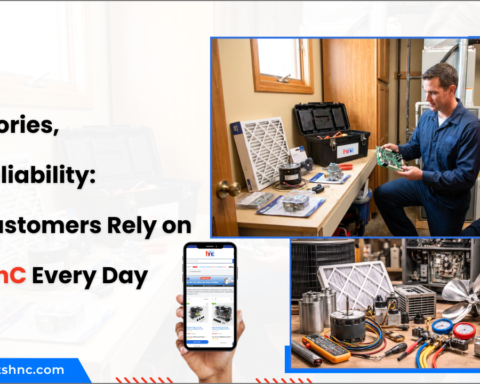Hybrid CCTV systems combine two types of camera technology — traditional analog and modern IP (Internet Protocol) cameras. Instead of replacing the old system, you can mix both camera types in one setup. This makes it easier and cheaper to upgrade your security without starting from scratch.
Imagine getting the benefits of high-quality video, smart alerts, and remote viewing — all while keeping your older cameras working. That’s the power of a hybrid system. It offers the best of both worlds and gives you more control, more features, and more value for your money.
In this article, we’ll explore why hybrid CCTV systems are becoming more popular in homes, businesses, and public places. We’ll look at how they work, their benefits, and why they’re quickly becoming the future of video surveillance.
What is a Hybrid CCTV System?
A hybrid best quality CCTV security system is a mix of old and new technology. It combines analog cameras (older technology) with IP cameras (newer digital technology). This gives users the best of both worlds.
With a hybrid system, you don’t have to remove your old cameras. You can keep using them and also add new digital ones. This saves money and gives more features.
How Do Hybrid CCTV Systems Work?
Hybrid systems use a hybrid DVR (Digital Video Recorder) or NVR (Network Video Recorder). These recorders can support both analog and IP cameras. The system connects all the cameras to one central unit.
The user can see all the camera feeds in one place. The feeds can also be viewed on mobile devices, computers, or TVs.
Why Hybrid CCTV Systems Are Gaining Popularity
Many people are now choosing hybrid systems over traditional ones. There are many reasons for this shift:
1. Cost-Effective
Installing a full IP system can be expensive. But with a hybrid system, users can keep their current analog cameras. They only need to buy digital cameras when needed. This reduces the overall cost.
2. Easy Upgrade
Upgrading to digital cameras does not mean replacing the whole system. Users can slowly upgrade over time. This is helpful for businesses with limited budgets.
3. Flexible and Scalable
Hybrid systems are very flexible. Users can mix and match camera types. As their needs grow, they can add more cameras easily.
4. Better Video Quality
Digital (IP) cameras offer better image quality. You get clearer pictures and more detail. This helps in identifying faces, license plates, or incidents.
5. Remote Access
Hybrid systems can be connected to the internet. This means you can watch live footage from anywhere in the world. All you need is a smartphone or computer.
6. Advanced Features
With IP cameras, hybrid systems can offer smart features. These include motion detection, facial recognition, and alerts. You get more than just video.
7. Longer Storage Time
Digital systems allow video to be stored more efficiently. You can keep footage for a longer time without using too much space.
The Problems with Traditional CCTV Systems
Traditional analog CCTV systems are now outdated. They have many limitations.
- Low video quality: The footage is not always clear.
- No smart features: They only record video. No extra features like alerts or remote access.
- Hard to expand: Adding new cameras is difficult.
- Limited control: You need to be on-site to view the video.
These issues make it clear why many people are switching to hybrid systems.
Why Full IP Systems Aren’t Always the Answer
You may wonder: why not just switch to a full IP system?
Here’s why some people still prefer hybrid systems:
- High cost: Replacing all cameras at once is expensive.
- Complex installation: IP systems need more setup.
- Wasting working equipment: If your analog cameras still work, throwing them away feels wasteful.
- Training needs: Staff may need time to learn new systems.
So, a hybrid solution becomes the smart choice.
Where Hybrid CCTV Systems are Used
Hybrid systems are now used in many places:
- Small businesses: Owners can upgrade slowly as their business grows.
- Large offices: Easy to expand across buildings or floors.
- Schools and universities: Cost-effective for large campuses.
- Hospitals: Important to have clear images and secure data.
- Warehouses and factories: Useful in wide areas with mixed lighting.
- Homes: Some homeowners want extra safety with modern features.
More people are choosing Hybrid CCTV Systems Singapore to meet their modern security needs while keeping costs low and flexibility high.
Benefits of Hybrid CCTV Systems
Let’s break down the major benefits:
1. Saves Money
You can keep your old analog cameras and add new IP ones only when needed.
2. Easy to Use
Most hybrid systems have user-friendly software. You don’t need to be a tech expert.
3. Remote Monitoring
You can check your cameras while at work, on holiday, or anywhere else.
4. Smart Alerts
Get alerts on your phone if there’s movement, noise, or a break-in.
5. More Control
You can zoom in on videos, save clips, and share them easily.
6. Future-Proof
As technology changes, your hybrid system can grow with it.
Things to Consider Before Choosing a Hybrid System
Before buying a hybrid CCTV system, think about these:
- How many cameras do you need?
- Do you want remote access?
- What features are important? (e.g., night vision, motion alerts)
- What is your budget?
- Do you already have analog cameras?
- Do you want to add more cameras later?
Answering these will help you pick the right system.
How to Set Up a Hybrid CCTV System
Setting up a hybrid system is easier than most people think.
Step 1: Assess Your Current Setup
Check how many analog cameras you have. List the areas you want to improve.
Step 2: Choose the Right Recorder
Buy a DVR or NVR that supports both analog and IP inputs.
Step 3: Plan Your Network
Make sure you have a stable internet connection. This helps with remote viewing and smart features.
Step 4: Install New Cameras
Place IP cameras in important areas: entrances, exits, or storage rooms.
Step 5: Connect and Test
Connect all the cameras to the recorder. Test video quality and features.
Step 6: Set up Mobile or PC App
Download the app to view the feed on your phone or computer.
The Future of Surveillance is Hybrid
Technology is always changing. But not every user can afford to replace all their devices every few years. Hybrid systems give people a smart middle path.
They offer new features without making old cameras useless. They give flexibility and control. They help homes and businesses stay safe without spending too much.
Over time, more manufacturers are building better hybrid systems. Prices are going down. Features are improving.
In the future, most security systems will likely be hybrid, at least during the transition to full digital.
Conclusion
Security is more important now than ever. Cameras play a big role in protecting people, property, and peace of mind.
Hybrid CCTV systems are the bridge between the past and the future. They let users move to digital at their own pace. They are flexible, smart, and cost-effective.
If you want to upgrade your security without wasting your current setup, hybrid CCTV systems are the answer. That’s why they are not just a trend — they are the future.








